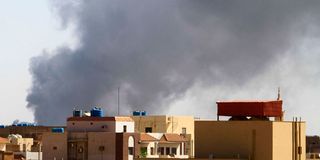Prime
Sudan fighting intensifies despite US sanctions

Smoke billows in the distance in Khartoum amid ongoing fighting between the forces of two rival generals, on May 15, 2023.
Khartoum,
Shelling rocked greater Khartoum on Friday, as fighting between Sudan's warring generals intensified despite US sanctions imposed after the collapse of a US- and Saudi-brokered truce.
Witnesses reported artillery fire around the state television building in the capital's sister city of Omdurman, just across the Nile.
For nearly seven weeks, deadly fighting between the regular army and the paramilitary Rapid Support Forces (RSF) has gripped Khartoum and the western region of Darfur despite repeated efforts to broker a humanitarian ceasefire.
The army announced it had brought reinforcements to the capital from other parts of Sudan to participate in "operations in the Khartoum area".
Sudan analyst Kholood Khair said the army was "expected to launch a massive offensive" to clear the paramilitaries from the streets of Khartoum.
Washington slapped sanctions on the warring parties Thursday, holding them both responsible for provoking "appalling" bloodshed.
The US Treasury placed two major arms companies of the Sudanese Armed Forces, Defence Industries System and Sudan Master Technology, on its blacklist.
In parallel, it placed sanctions on gold miner Al Junaid Multi Activities Co and arms trader Tradive General Trading, two companies controlled by RSF commander Mohamed Hamdan Daglo and his family.
The State Department meanwhile imposed visa restrictions on both army and RSF officials, saying they were complicit in "undermining Sudan's democratic transition." It did not provide their names.
Analysts question the efficacy of sanctions on Sudan's rival generals, both of which amassed considerable wealth during the rule of longtime dictator Omar al-Bashir, whose government was subjected to decades of international sanctions before his overthrow in 2019.
So far neither side has managed to gain a decisive advantage. The regular army, led by Abdel Fattah al-Burhan, has air power and heavy weaponry, but analysts say the paramilitaries are more mobile and better suited for urban warfare.
Just hours after the army announced it was quitting US- and Saudi-brokered ceasefire talks on Wednesday, troops attacked key bases of the RSF in Khartoum.
One air and artillery bombardment by the army struck a Khartoum market, killing 18 civilians and wounding 106, a committee of human rights lawyers said.
The army will want to make "some military gains before committing to any future talks, in order to improve their bargaining position", said Khair, the founder of Khartoum-based think tank Confluence Advisory.
Since fighting erupted on April 15, more than 1,800 people have been killed, according to the Armed Conflict Location and Event Data Project.
The UN says 1.2 million people have been displaced within Sudan and more than 425,000 have fled abroad.
Conditions are especially dire in Darfur, on Sudan's western border with Chad, where those fleeing the violence told Doctors Without Borders (MSF) of "armed men shooting at people trying to flee, villages being looted and the wounded dying" without access to medical care, the aid group said on Friday.
Later Friday, the UN Security Council was set to review its mission in Sudan, whose mandate expires on Saturday.
The majority of mission staff have been evacuated and Burhan has demanded the replacement of its current chief, Volker Perthes, who the Sudanese general accused of stoking the conflict with the RSF.
When the fighting erupted, the UN envoy had been focused on finalising a deal to restore Sudan's promised transition to civilian rule which was derailed by a 2021 coup by the two generals.
Growing differences between them had threatened to torpedo the deal, which they were supposed to iron out in UN-backed talks on the day they turned Khartoum into a war zone.
Some 25 million people -- more than half Sudan's population -- are now in need of aid and protection, according to the United Nations.
Aid corridors that had been promised as part of the abortive humanitarian truce never materialised and relief agencies say they have managed to deliver only a fraction of the needs.
Humanitarian agencies have repeatedly warned of the rainy season set to start this month, when the already difficult conditions "will worsen and rivers will flood, complicating movement and supplies," said MSF's emergency coordinator Christophe Garnier.
Medics and relief agencies say 18 aid workers have been killed as widespread looting has gripped the main battlegrounds.
Aid agencies have reported "the theft of 115 vehicles and the looting of 57 warehouses and 55 offices," according to the mediators of the failed truce.
bur/kir/ami




